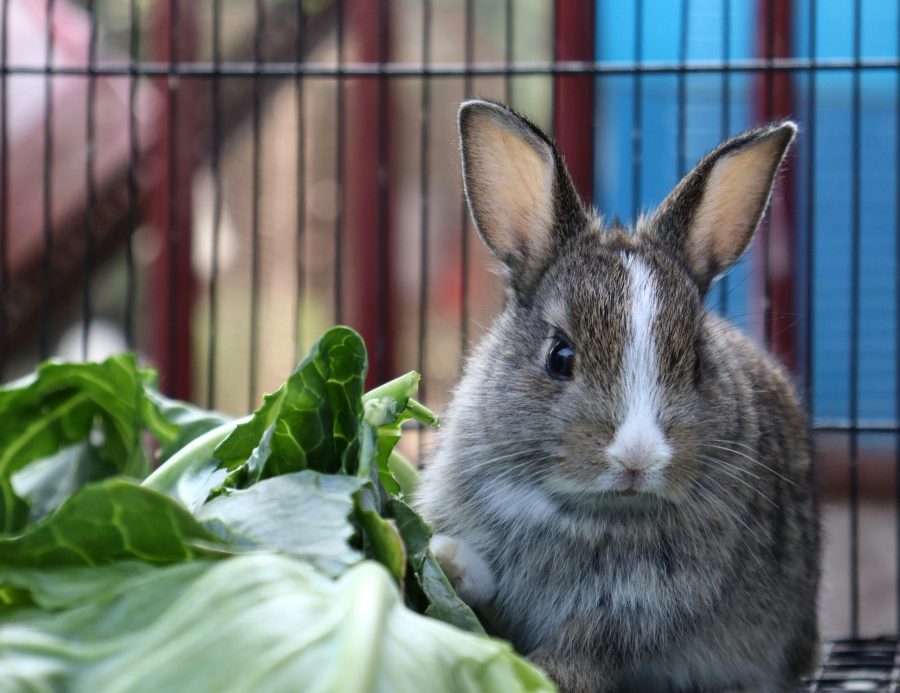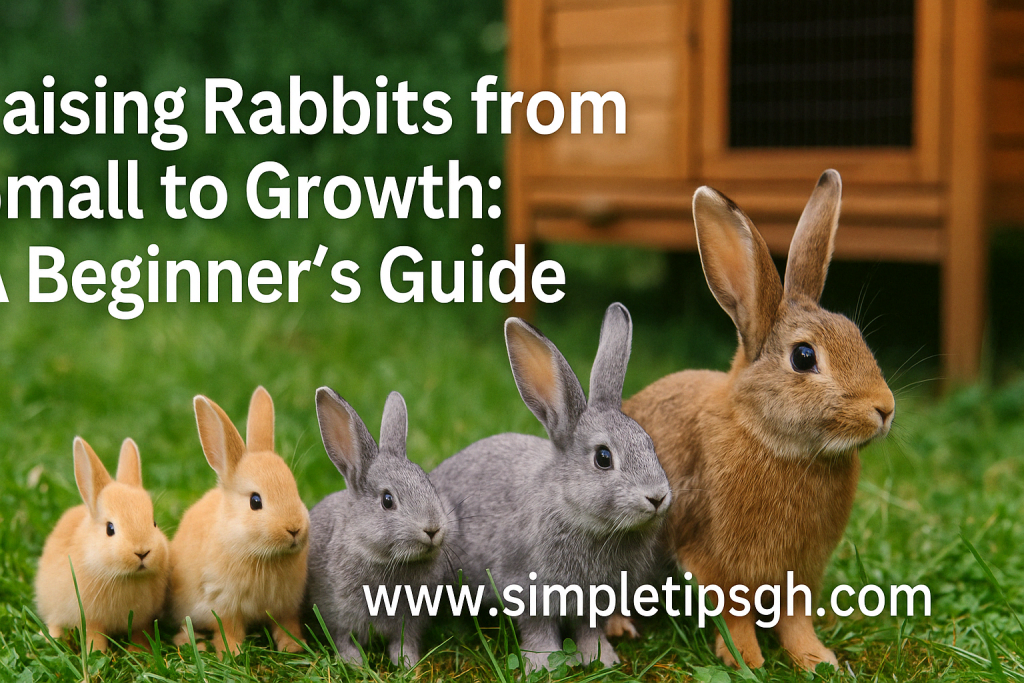Raising Rabbits from Small to Growth: A Beginner’s Guide

Raising rabbits is a rewarding experience when you understand the process. Whether you want them as pets or for meat, you still need the best to succeed. However, you may have to learn more about rabbit farming before commencing this business. This article will help you through the key steps to raise rabbits from young to full-grown rabbits. You only need to grab coffee and follow the post from word to word.
If I tell you that one female rabbit can give you 50 rabbits a year, will you agree? Yes, that is possible only when you can practice the strategies I have been using for the past 2 years.
To get started with your rabbit farming, the basic things you need are your cage, the feeds (diet) for your rabbits, the feeders (basins for feeding them with), and a good water source for your rabbits.
In a situation where you don’t have a cage yet to start, you can start with an open place for them to roam and eat, but still get them a good place to sleep. Make sure you have enough water source and food for your rabbits when preparing to use an open space. This practice requires attention and care.
You can equally adopt the cage system later, just like I do, or use a spacious room in good condition to start raising rabbits. Migrate to the cage system even if you begin with the open space system of rearing your rabbits.
Rabbits Cages
To start this business, you will need a cage to keep your rabbits safe from any harm. Get your rabbits nice and spacious cages for them to play and sleep well. With the younger rabbits, they need good care and warmth.
Don’t keep more than 4 rabbits in one cage, especially when the cage is not spacious enough. Clean your cage every day to prevent infections in your rabbits.
Disinfect it regularly to prevent them from contracting any form diseases. Rabbits can easily get heart attack or die if you use high chemicals with high scent.
Small Rabbit Care
Another thing to desist from is lifting your rabbits frequently. It may affect their health because rabbits are fragile.
Rabbits do not like people carrying them around all the time, like dogs or cats. Pregnant rabbits often face the delicate challenge of maintaining their health, as even the slightest unusual touch can lead to the heart-wrenching risk of miscarriage. It’s a reminder of how fragile and precious rabbits can be.
When you bring home small rabbits, also known as kits, it is important to keep them in a cage that you bought or made to keep them warm. Young rabbits cannot handle cold or damp spaces if not the cage.
Keep their space dry, clean, and away from drafts or any form of dirt. Use soft bedding like straw or wood shavings in each of the space provided. Avoid materials that can cause allergies or breathing problems to you rabbits.
Small rabbits need quiet environment and gentle handling. Rabbit don’t like loud noises because noise can scare them. Place their cages away from where there is too much noise.
Be patient when taming them, and handle your rabbits with care. Rabbits build trust over time, especially when they are not forced to interact.
Make sure their cage or hutch is secure from attacks. Young rabbits are curious and may try to squeeze through small gaps. Check their enclosure often to avoid escape or injury to them.
Feeding Your Rabbits
Feeding is one of the most important parts of raising rabbits. A healthy and nutritious diet can keep your rabbits healthy and stronger. Start by giving them plenty of hay them. Giving them such food helps with their digestion and keeps their teeth healthy. Hay should make up most of their food you give to your rabbits regularly.
Also, add fresh vegetables like romaine lettuce, basil, cucumbers, cabbages and carrot tops. Avoid iceberg lettuce and sugary treats because it may cause stomach upsets.
If you choose to feed them with pellets, go for the ones with high fiber. Don’t feed too much of pellets; just a handful a day is enough.
The feeders must be clean always for them to feed from. Clean all dirt from the feeders and make it dry to be used.
Getting enough fresh water is a must for them. Change it daily. Use a clean bowl or a hanging bottle. Make sure it’s not too high or too low for the rabbit to reach.
As they grow, their food needs will change. Monitor their weight and energy levels. If they seem tired or lose interest in eating, speak to a vet officer.
Health Care
Keeping your rabbit healthy starts with observation to determine all changes in their movement. Watch their behavior every day, especially the younger ones.
Are they eating well? Are they active? Healthy rabbits hop around, groom themselves, and stay alert.
If your rabbit has watery eyes, a runny nose, or soft stools, these are signs of illness. Take them to a vet who knows how to treat rabbits. Don’t delay—rabbits hide pain well, so small problems can grow quickly.
Regular grooming is one thing a farmer should never ignore. Brush long-haired breeds to stop matting. Trim their nails once every month. Overgrown nails can cause pain or injury to it or others. For dental care, feeding hay helps to keep it strong and healthy. Their teeth grow often, and chewing keeps them at the right length.
Vaccinations are important in some areas where there seem to be issues. Ask a local vet if your rabbits need them. Also, check for parasites like fleas or mites, especially in outdoor rabbits. These tips will help you reduce or avoid casualties on your farm.
Hygiene Practices
A clean living space, especially the cage, is essential when raising rabbits. Dirty hutches can lead to infections and bad smells from the place of abode. Remove soiled bedding from the cage every day. Once a week, wash the entire cage with mild soap and warm water.
Rabbits are clean by nature, but they need help with their space. Never allow many rabbits to sleep live in one cage. This can lead to transfer of infection from one to the other.
Use litter boxes if they are in indoor hutches. Line the box with paper or rabbit-safe litter. Make sure you change it regularly.
Also, make sure food and water dishes are always clean. Dirty bowls can grow bacteria, which may wipe out all your rabbits..
When cleaning, avoid using strong-smelling cleaners like bleach or ammonia. These can harm your rabbit’s lungs. Use rabbit-safe disinfectants or natural cleaners.
Rabbit Breeds You Can Choose for Farming
There are many breeds out there to choose from as a farmer when raising rabbits. Some are small and perfect for homes. Others are large and good for farming. Each breed has its traits and the care it requires.
Mini Rex and Netherland Dwarf are small, cute, and calm type of breeds. They are the best for beginners. Breeds like the New Zealand White and Californian rabbits are often raised for the purposes of meat or breeding. They grow fast and have strong bodies than other ones.
Angora rabbits are known better for their wool. But they need daily grooming regularly if you choose them.
Flemish Giants are the biggest of all the breeds. If you want big rabbits then you may go or them. They need more space and food, but are gentle and friendly.
Choose the type of breed that matches your lifestyle. If you’re in a small home, go for a small breed rather than the bigger ones. If you want rabbits for business, larger breeds may be better to choose from.
Learning from Others
One of the best ways to succeed in raising rabbits is to learn from other people. Join online groups or rabbit clubs in your area to understand more about them. These communities share tips, solve problems, and give support when you need it.
Talk to experienced rabbit keepers to avoid falling into the problems they once encountered.
Ask how they started, what they feed their rabbits, and how they deal with sickness when it arises. People with hands-on experience often advise that books or videos don’t cover.
Related Post
[10 Safe Vegetables for Rabbits]
[Unsafe foods you should never give to rabbits]
You can also attend rabbit shows or visit other people’s farms. Seeing different setups helps you improve on your own. Take notes on feeding systems, housing designs, and health practices.
Conclusion
Raising rabbits is easy, but it needs time, love, and experience from others. Start by getting the best breeds, cage, feeds, feeders, and enough water source. Feed them well. Watch their health. Keep their cages clean from infections. Choose a breed that fits your goals. Most of all, be open to learning from other farmers.
With the right steps, your small rabbit will grow into a happy, strong adult. The journey is full of joy; each rabbit you raise will teach you something new.
Are you ready to start your journey in raising rabbits?

